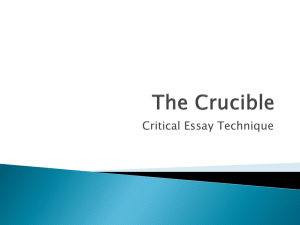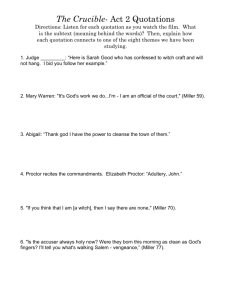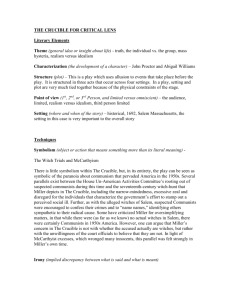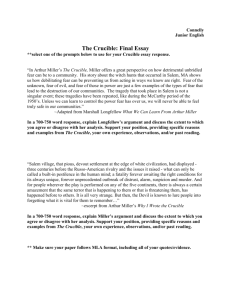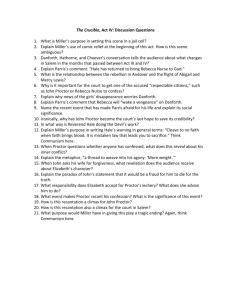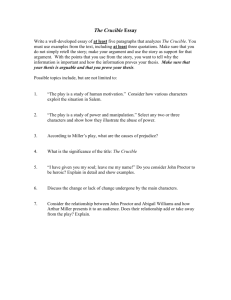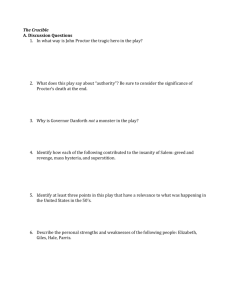Crucible Justice Essay Example
advertisement
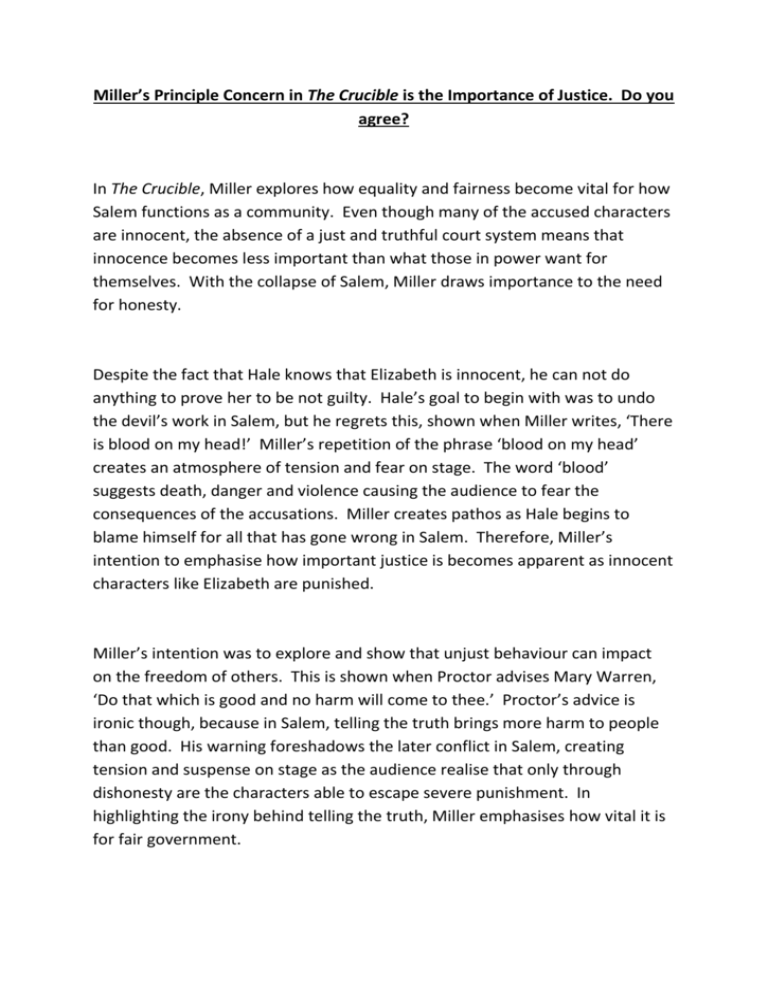
Miller’s Principle Concern in The Crucible is the Importance of Justice. Do you agree? In The Crucible, Miller explores how equality and fairness become vital for how Salem functions as a community. Even though many of the accused characters are innocent, the absence of a just and truthful court system means that innocence becomes less important than what those in power want for themselves. With the collapse of Salem, Miller draws importance to the need for honesty. Despite the fact that Hale knows that Elizabeth is innocent, he can not do anything to prove her to be not guilty. Hale’s goal to begin with was to undo the devil’s work in Salem, but he regrets this, shown when Miller writes, ‘There is blood on my head!’ Miller’s repetition of the phrase ‘blood on my head’ creates an atmosphere of tension and fear on stage. The word ‘blood’ suggests death, danger and violence causing the audience to fear the consequences of the accusations. Miller creates pathos as Hale begins to blame himself for all that has gone wrong in Salem. Therefore, Miller’s intention to emphasise how important justice is becomes apparent as innocent characters like Elizabeth are punished. Miller’s intention was to explore and show that unjust behaviour can impact on the freedom of others. This is shown when Proctor advises Mary Warren, ‘Do that which is good and no harm will come to thee.’ Proctor’s advice is ironic though, because in Salem, telling the truth brings more harm to people than good. His warning foreshadows the later conflict in Salem, creating tension and suspense on stage as the audience realise that only through dishonesty are the characters able to escape severe punishment. In highlighting the irony behind telling the truth, Miller emphasises how vital it is for fair government. The Puritan society’s failure to perceive the differing views of others leads to the truth and fairness of the community to dissemble. Parris confirms this view by suggesting ‘All innocent and Christian people are happy for the courts in Salem’. As a result, the audience is left agitated by and ridicules the hypocrisy of Salem’s justice system; it is ironic that the righteousness of the community becomes distorted and the innocent pressured to confess the ‘truth’ by those who actively promote pure Christian values. Miller highlights that Puritanism is ‘grounded on the idea of exclusion and prohibition,’ and as such, Salem is susceptible to corruption of its own ideologies because those with power are unwilling to see that it is the corrupt minority who determine what should be believed. The focus of Miller’s play is to explore the equality of a community run by a strict theocratic government. This is shown when Proctor says ‘What others say and what I sign is not the same.’ When Proctor says ‘not the same’ it highlights that he is willing to argue with authority and therefore creates tension on stage because the audience are left wondering if Proctor will be successful in his determination to prove the truth. Proctor’s claim reinforces how vital it is for the people of Salem to be treated the same way as each other and told the truth. Miller’s focus on the importance of treating all people in the same way draws attention to the need for justice in Salem. The value of fair judgement is virtually non-existent in The Crucible – it boils down to ‘confess yourself or you will hang.’ Danforth highlights this message as the ultimatum he provides gives the accused very little choice. It is ironic that those accused of witchcraft are forced to make the decision between losing a good reputation or dying. Miller creates pathos through his focus on the lack of truth and honesty during the witch trials, suggesting that those who are treated unfairly should be pitied. As such, Miller’s focus on the value of and need for fair judgement becomes a primary concern when considering the importance of justice as a theme of The Crucible.
